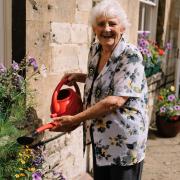Helping families to say goodbye to their loved ones is a key part of the job for those special people who are part of the Sue Ryder Hospice at Home team.
Senior nursing assistant Melissa Tiley-Waters, from the Sue Ryder Leckhampton Court Hospice at Home team has worked in palliative and end-of-life care for eight years.
Here she discusses how saying goodbye can help with bereavement and highlights the national healthcare charity’s new Room Full of Love campaign.
Q: What is a Room Full of Love?
A: It is a fundraising campaign to enable Sue Ryder’s nurses and expert care teams to continue to go above and beyond, by helping families to give their loved ones a better goodbye.
The past year has been difficult for everyone, with many families experiencing bereavement and loss. Sue Ryder wants to take away some of the hardship that comes with losing a loved one, by helping to fill rooms with music, much-loved pets, or the people who mean the most.
The aim of the appeal is to help Sue Ryder take the pain, stress, and uncertainty away through their medical expertise, emotional intelligence and practical support, leaving families free to focus on what’s important – sharing their love and saying goodbye.
Q: How does “filling a room” with love help the patients?
A: The Sue Ryder Hospice at Home team supports patients by enabling them to stay in their own homes for their final days.

This not only ensures their comfort but also means there is a bit of normality, which I think patients really like. If you would normally have the radio on in the room and a load of washing in the machine every day, then to suddenly keep a house in absolute silence would be strange for a patient.
People find familiar sounds comforting. Having hospice care at home also means patients can be surrounded by their photos and memories, with their families by their sides. We often talk about the photos that people have around them.
You also build relationships quickly when you are in and out of someone’s house three times a day: you get to know your patients well and are therefore always aware when there is even a slight change in their condition.
Q: How does it help the families to cope?
A: I would say that supporting the family can be 50 per cent of what we do. Sometimes we end up spending more time with the family members if the patient is comfortable or sleeping.
The family are facing the bereavement and loss of someone they love as well as trying to look after them, using medical equipment they have never used before and dealing with medication.
They are often frightened of doing things wrong and any change in the patient can be scary for them, so we spend a lot of time offering reassurance and preparing them for what will happen.
Q: Can you tell us about a family you have helped?
A: Yes, we helped care for David and his family. I remember when we suggested it was time for him to have a hospital bed, the family all got together and rearranged the front room, and it became a beautiful bedroom for him.
On the day David died, we called their vicar for them and he came, and I hope that gave them some comfort. David kept his Bible beside his bed, so we knew his faith was important to him.
When the family stepped out so we could perform the last offices we picked a rose from a bush in the garden and laid it on his pillow and placed his Bible under his hand. It’s a way for us to say that we have been privileged to look after your family and hopefully it also leaves them with a good memory, as any of us would want.
Q: What do you enjoy most about your job?
A: People say it must be a depressing and difficult job, but it’s actually such an honour. It’s one of those jobs where it doesn’t matter how your day went, you can guarantee that at least one person will have sincerely thanked you.
It happens at every house, every day and when someone is genuinely thanking you and means it, you don’t take that for granted.
Families are always so grateful, and we can feel that, which means the job is not as hard as people may imagine it to be. I love my working days.
Once I’m in the uniform and in the car, I’m happy. Sometimes it’s all about talking to the patient, hearing what they have to say and letting them offload a bit. I’m privileged that I have a job that allows me to take my time with patients.
For more information on Room Full of Love visit sueryder.org/fillaroom.



























